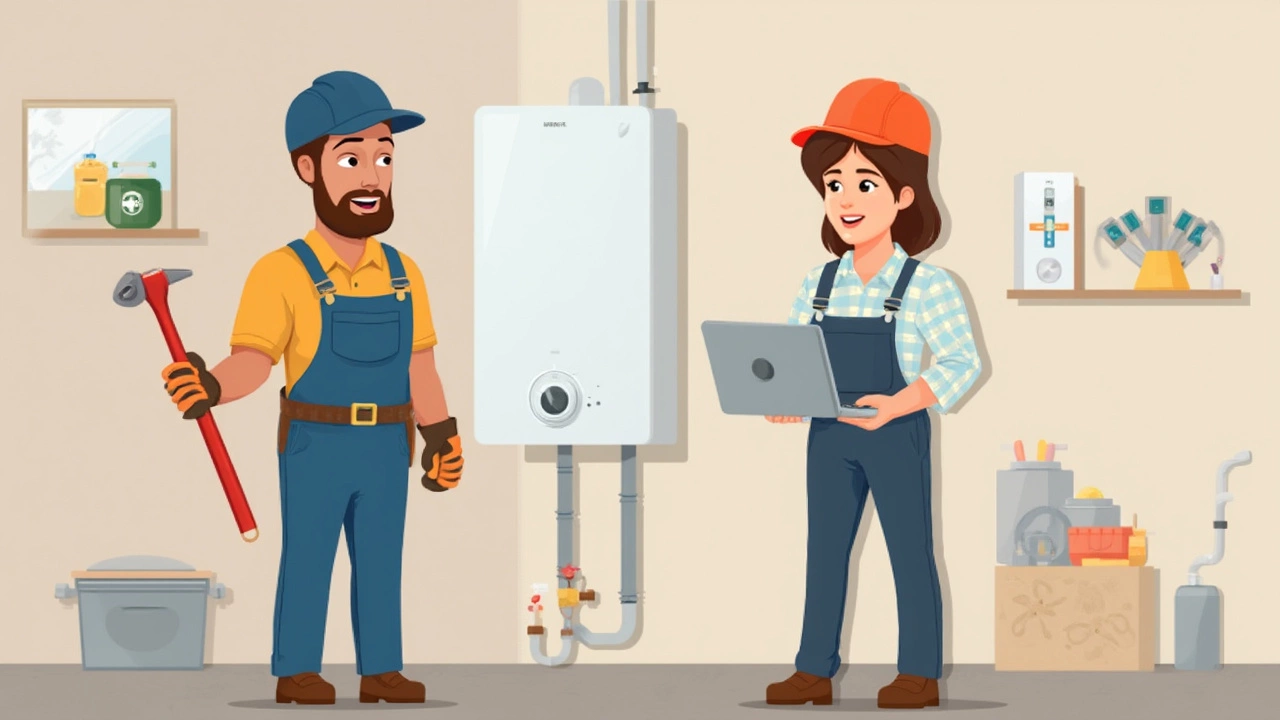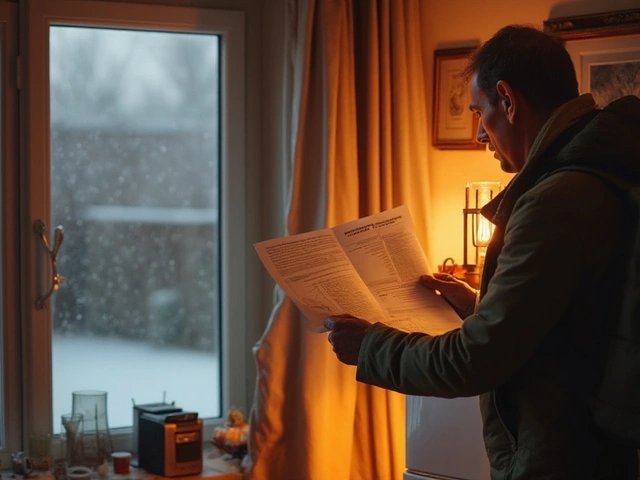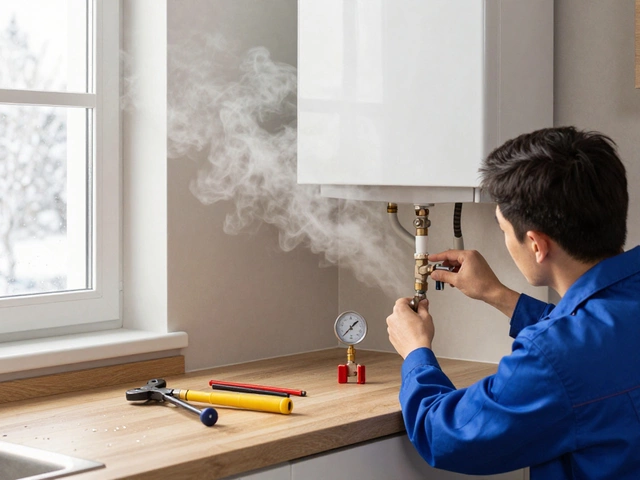If your boiler is acting up or just flat-out dead, the first question is often, “Do I call a plumber?” People mix this up all the time, and it can waste a lot of time and cash. Plumbers do a ton, but not all of them mess with boilers. Not every plumber is trained, licensed, or even allowed to install or fix one. So if you’ve got zero hot water, don’t just Google ‘local plumber’ and dial the first number that pops up.
Here’s the main thing: some plumbers handle boilers, but it depends on their background and, more importantly, their qualifications. In most places, boiler work needs someone who’s certified for gas or specialized heating systems—the usual plumber isn’t always set up for that. If you get it wrong and hire the wrong person, you could end up with leaks, fines, or way worse: a dangerous boiler. So, save yourself the hassle—know who you need before picking up the phone.
- What Plumbers Actually Do
- Boiler Installation: Plumber or Heating Engineer?
- How to Choose the Right Professional
- Pro Tips for a Smooth Boiler Job
What Plumbers Actually Do
Most people picture a plumber bent over under the sink fixing a leaky pipe, but they handle way more than that. The bread and butter for plumbers is your basic water stuff: fixing sinks, toilets, taps, showers, and pipes all over your house. They get called for blocked drains, broken pipes, or anything that means water is going where it shouldn’t. They also handle installation and repairs for bathrooms, kitchens, and laundry rooms.
So where does boiler installation fit in? Thing is, not every plumber is trained to tackle boilers. While some can handle basic hot water tanks or connect pipes to your boiler, installing, fixing, or maintaining a gas boiler is a whole other ballgame. Gas work is regulated because of the risks involved. In the UK, for example, only Gas Safe registered engineers are legally allowed to work on gas boilers. In the US, plumbers might need special licensing or registration by state.
- Water leaks
- Pipe repairs and replacements
- Toilet and faucet issues
- Blocked drains or sewers
- Shower and bath fittings
- Radiator repairs (non-gas)
- Hot water cylinder installs (sometimes, not boilers)
Check out this quick look at licensed plumber services versus what needs a heating engineer:
| Job | Plumber | Heating Engineer |
|---|---|---|
| Leaky tap | ✔️ | |
| Blocked drain | ✔️ | |
| Installing a gas boiler | ✔️ | |
| Fitting a bathroom | ✔️ | |
| Boiler repairs (gas) | ✔️ |
So, if your problem is with radiators or pipes, a plumber’s the right call. If it’s a gas boiler, you need someone with advanced heating skills and the paperwork to prove it. Don’t just assume every plumber will touch your heating system—ask before they show up with their toolbox.
Boiler Installation: Plumber or Heating Engineer?
This gets confusing for a lot of people: who’s really supposed to put in a boiler? The short answer is, it’s not always your average plumber. In the UK, for example, most new boiler installs have to be done by a Gas Safe registered engineer. In the US, different states have different rules, but the idea is the same—legally, only someone with proper heating certification can touch gas boilers.
Here’s where the difference lies: a plumber might fix leaks and install sinks, but a heating engineer (sometimes called a boiler engineer) is trained and certified in working with boilers and gas. If someone’s working with gas and they aren’t licensed, you could get fined or, worse, they could wreck your home’s safety. In fact, according to the Gas Safe Register, over 1 million gas jobs are done by illegal fitters every year. That’s a mind-blowing number, especially when you consider the risk.
“Only Gas Safe registered engineers are legally allowed to install, repair, and service gas boilers, cookers, and fires,” says the Gas Safe Register.
So how do you know someone’s legit? Check their ID and registration number. In the UK, everyone working on gas appliances has to show you their Gas Safe ID. In the US, look for local or state licenses for HVAC or boiler work. Never just take someone’s word for it.
| Job Type | Who’s Qualified? | Extra Requirements |
|---|---|---|
| Fixing water pipes | Licensed Plumber | Plumbing license |
| Installing boilers (gas) | Heating Engineer/Boiler Engineer | Gas Safe (UK), HVAC or local license (US) |
| Oil boiler install | Heating Engineer | OFTEC (UK) or equivalent (US/EU) |
Thinking of getting your old boiler swapped? Always double-check who you’re hiring. Only boiler installation and repairs done by a certified pro keeps your home safe and your insurance valid. Cutting corners here can end up costing you way more than you’d save upfront.

How to Choose the Right Professional
Not all pros who claim to work with boilers are actually qualified, so it pays to dig a little. First off, check what your job really needs. If it’s just a leaky radiator or a clogged pipe, a plumber is probably fine. But if you need a new boiler installation or anything to do with gas, that’s a whole different ball game.
In the UK, anyone working with gas boilers legally needs to be Gas Safe registered. In the US and Canada, look for a licensed HVAC technician with certifications specific to heating systems. These aren’t just fancy pieces of paper—without them, your warranty might be void, and insurance will have a field day if things go wrong.
| Country | Boiler Installer Certification |
|---|---|
| UK | Gas Safe Register (formerly CORGI) |
| USA | HVAC License (state-specific) + EPA certification |
| Canada | Red Seal Certification (Plumber or Gasfitter) |
Here’s what to check when hiring:
- Ask to see credentials: No paperwork, no deal. A legit pro won’t mind showing you.
- Double-check their ratings and reviews: Real experiences say more than fancy ads. Look for recent feedback on Google or Trustpilot.
- See if they specialize in boilers: Some plumbers only dabble in them. You want someone who installs or fixes boilers regularly, not just once in a blue moon.
- Get a written quote: Ballpark estimates over the phone mean surprises later. A proper quote should include parts, labor, and what happens if extra work crops up.
- Ask about warranty and insurance: If they’re not insured, you’re taking the hit if something goes wrong. Boiler makers often reject warranty claims if the install isn’t done right.
There’s no harm in asking a few tricky questions, too. For example, “What’s the biggest mess you’ve ever fixed with a boiler install?” Pros will have stories, and rookies might dodge it. Being nosy now saves you stress later.
Pro Tips for a Smooth Boiler Job
If you want your boiler installation or repair to go off without a hitch, you need to be smart from start to finish. A little prep and knowing what to watch for can save you time, stress, and money.
First, always check that the engineer is certified for your specific type of boiler—Gas Safe for gas boilers in the UK, or a licensed HVAC pro for North America. You can easily look them up on the official Gas Safe Register or your state licensing board. Don’t just take their word for it—ask for their card and check their ID. This stuff matters. Like the folks at Which? put it:
“Having your boiler installed by a registered professional isn’t just good practice—it’s the law, and it could save your life.”
Next, make sure you get an actual written quote, not just a rough price over the phone. This should spell out what’s being supplied, how much it’ll cost, and when they reckon they’ll finish. If your house is old or your current heating system is ancient, ask if there might be extra work needed like pipe replacements or extra controls.
- Clear the area before they arrive—boiler installs need space. Move stuff out of the way so the job’s faster and less risky for everyone.
- Find out if you’ll be without hot water or heating, and for how long. A swap can sometimes get done in a day, but bigger jobs can stretch to two or three.
- Ask about warranties and service plans. Genuine installers won’t dodge these questions. Decent boilers should have at least a 5-year warranty on parts and labor.
- After the job, the fitter should show you the controls. If you have no idea how the new timer or thermostat works, now’s the time to ask—don’t try to wing it once they’ve left.
If the installer is dealing with gas, they need to leave you with a completed Building Regulations Compliance Certificate (in the UK) or equivalent paperwork in other countries. No certificate? That’s a problem—chase it up until you get it.
Just remember: the cheapest quote isn’t always the best one. Look for honest reviews, clear explanations, and someone who actually listens to your questions. That’s how you dodge shoddy work and keep your home safe and warm.





